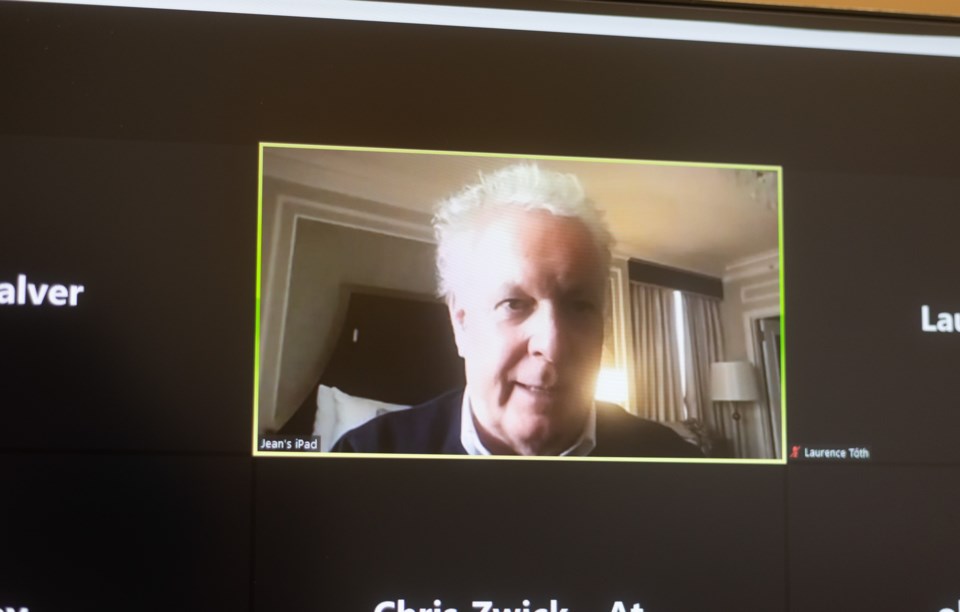Conservative Party of Canada leadership candidate Jean Charest says he would work to promote and support Alberta’s oil and gas industry, including when it comes to new pipeline construction.
In an exclusive interview with Great West Media publishers and editors on May 21, Charest discussed some of his plans should he be elected to replace ousted Conservative leader Erin O’Toole.
Charest is facing off against fellow leadership contenders Pierre Poilievre, Patrick Brown, Leslyn Lewis, Roman Baber and Scott Aitchison. June 3 is deadline to sell party memberships prior to the Sept. 10 leadership vote.
Charest, a former MP and premier of Quebec, was in Vancouver for the interview on Zoom with Great West Media members.
Regarding resource development, Charest said he is “definitely” in favour of building oil and gas pipelines.
“On major projects for resources, it’s difficult, if not impossible, to get them done unless the prime minister supports them and when did you ever hear Mr. Trudeau get up and say I support Energy East? It only happens if there is leadership,” Charest said.
“We are watching every day a war unfold in the Ukraine, funded by Europeans who are buying oil and gas from Russia. And we had had our act together and had been able to build pipelines in a timely fashion, we would be supplying them with clean and ethical oil instead, but we can’t do that. So lesson learned.
“On resources, my own belief is that we need to develop our resources. We need to be smart about it and yes we need to diversify.”
Along with other industries, agriculture is facing significant inflation pressures, including rising fuel and fertilizer costs, and the federal government could do more to help, he said.
“The price of our products are going to through the roof already,” he said. “There is a lot of pressure that is going to be applied and it will have to translate into higher prices. There’s not going to be much choice. I mean the producers are going to have to push the cost down to their clients. And it means higher prices for consumers in the end.
“We have to look at personal income taxes and give people a break so they that are not losing on personal disposable income because of the spike in inflation. Ultimately if we have to support our farmers we will have to do it financially to allow them to be able to function and to get their product to market and be able to make a profit out of it.”
There needs to be a thorough review of the federal spending that has taken place during the COVID-19 pandemic, he said.
“Should we have been spending money? The answer is yes. Should we have been spending as much? That’s very questionable. How we spent it also in a lot of areas questionable. The time will come, once we pull out of COVID, where the accounting for all this will have to be done,” he said.
Charest said while he supports the right to protest, a Charest-led government would do more to protect critical infrastructure, including border crossings, in the event of future protests.
“I’m proposing a law that would give police more powers to intervene more rapidly when there are blockades to strategic infrastructure in Canada,” he said.
A Charest-led government would make changes to employment rules, and in particular when it comes to older worker and pension rules, he said.
“I think we need to change our policies for what I call experienced workers; a nicer way to say older workers," he said. "It doesn’t make sense that in our labour market people are retiring at 60, 62 when we live a lot longer, we live healthier lives.
"We need to change that so people who are at that point in their lives have a choice to stay in the labour market, work if they want to work and not be penalized in their pensions.”
Healing regional and other divisions in Canada would be a priority should he be elected prime minister, he said.
“Are we going to go down the route of American-style politics of all this division and hot button politics and slogan-ism and attack dogs or are we going to be Canadian?” he said.
“There are literally millions of political orphans in this country, millions, and they’re looking for a political party that is fiscally conservative, responsible, and will have a strong economic plan for the country and that’s where I am.
“I see a country deeply divided right now. And it isn’t just the east-west. It’s also rural and urban Canada, and new Canadians and intergenerational and in a country that certainly is not living up to its promise.”
Charest said he is prepared to work closely with whomever is elected the new United Conservative Party leader in Alberta.
“It’s not for me, it’s not for the prime minister of Canada to second guess whoever Albertans chose as their leader. That is a decision that belongs to Albertans and I will respect that and I will work sincerely and honestly and with enthusiasm who whoever may be the leader.”
A Charest-led Conservative government would work to “help community newspapers be viable” including when it comes to allocating government advertising spending, he said.



